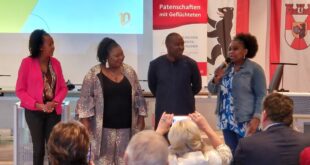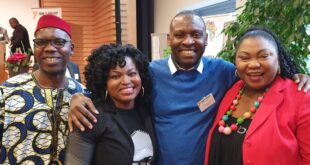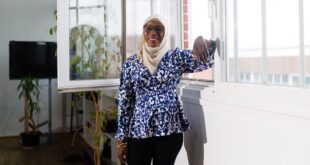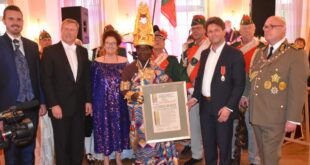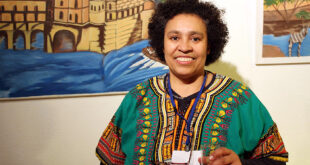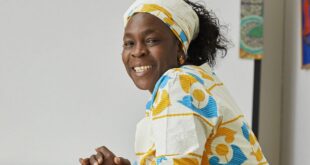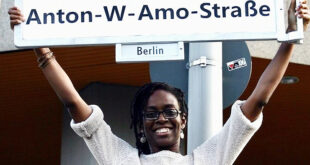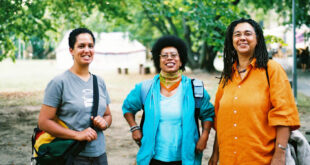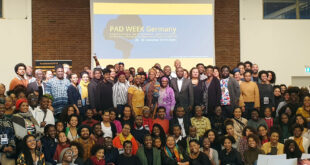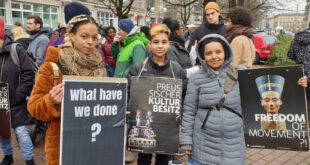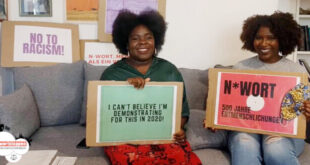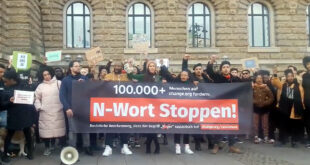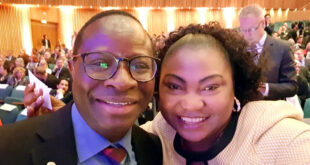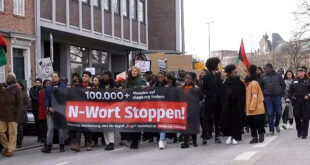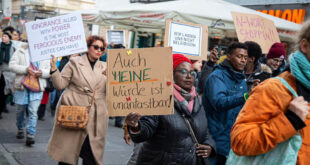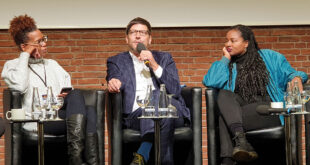“I’m used to not being German enough, living in this country, but not being African enough to represent Africa in Germany was a new one to me,” writes Jennifer Odusola, an Afro-German, on her experience of being considered not qualified to represent her father’s continent of origin.
Thoughtless statements or comments that aren’t meant to ‘offend’ often have ways of exposing hidden conflicts regarding one’s own identity, and the confusion that a bicultural person might experience for years will leave its mark.
The question of belonging in terms of nation, country or continent may have already been answered, yet society is frequently of the view that it should provide the answer for us and we thus end up in pigeonholes, despite how we may feel about this.
‘To be or not to be’, black or white, left or right; choices in that sense can’t be made by us. It is more likely that neither one nor the other is the case for a bicultural person; it is something in between. We don’t belong in pigeonholes; we are autonomous individuals who decide for ourselves which nation defines us, even if this is situational.
The reason for this article was a continental designation of my person, which seemed harmless enough at first. I felt restricted in my individuality, although what had been said was unintentional and without ulterior motive.
We had been invited to a parents’ meeting at my son’s childcare centre and it was well attended. The childcare centre in Hamburg is an excellent facility specialising in children with migration background (with and without papers) and with an emphasis on supporting their individual identities. The teachers as well as the children they look after are multilingual and of various nationalities. By allowing the children to experience a multicultural and cosmopolitan community based on the childcare centre’s anti-racist concept, a foundation for self-confident children from migrant backgrounds in Germany is established.
But back to the parents’ meeting: following the review, clarification and constructive discussion of the obligatory subjects, the election of the parents’ council was next on the agenda. To my astonishment this proved to be an extremely difficult, even delicate, affair.
Even though six committed women, including myself, were more than prepared to devote spare time to fulfil the tasks of the parents’ council, the election was adjourned. Some of the mothers had, quite understandably, asked for a week to think it over and assess the functions of this ‘office’ to decide about their candidacies.
As I mentioned before, the childcare centre specialises in the support of children with a migration background and this entails an active involvement in the centre’s activities by parents who are not of German origin. Had this been given as a reason, I would have been satisfied; however, the reason for the centre’s dissatisfaction about the candidates was a lack of continental participation.
The centre’s administration would have liked to see each ‘continent’ present at the parents’ meeting to come up with at least one candidate. This, however, was discrimination against the parents who had volunteered as candidates: too many Germans or bicultural persons, although we too represent the children’s centre and its special concept.
Well, be that as it may, Turkey was still missing representing Asia, as was Africa. Africa, I thought feeling confused, hang on, why Africa, I’m here, am I not? So I had to ask and find out which continent my humble self was assigned to. To my astonishment it was Europe, or more specifically Germany, and although most people knew that I am bicultural, being of bi-national parentage, my identity was ignored despite the fact that I have dual citizenship.
I see myself as half German and half Nigerian, and it is the continents to which these two countries belong that I could be a worthy representative of. It should have been my decision which continent I represented and I should have at least been given the chance to make that decision.
Following the decision to adjourn the election, a German father was fed up that the matter had not been resolved and said, ‘The Turks should talk things over and provide a candidate.’ Uh-oh, now he’d done it. His statement caused much collective grumbling and head-shaking, not among the Turks but among the Germans. I agree that the term Turks can have a certain connotation, but certainly not in this context. We were looking for representatives of the Asian continent, and since we have only parents of Turkish origin, how else would this father have phrased it?
I know that my father would not object to the term ‘the Nigerians’, nor would my mother be offended by the term ‘the Germans’, given that this is used within context. What happened here was that a politically correct statement was responded to with prejudice. Why should a Turk feel insulted by being called a Turk? I’m convinced that there was no malice in this. Thus the debate on continental unpreparedness entered the second round.
When one of the German mothers who lives in a bi-national relationship with an African complained that there had never been any African members on the parents’ council and that there might be communication problems, an African father felt affronted and, I assume, degraded, and rejected vehemently what he perceived to be a stereotype.
In the meantime, it had gone quiet in anxious anticipation of a racist debate. The father in question told the mother in no uncertain terms and perfect German: “The fact that I come from Africa does not imply that I cannot speak German!” And that was that. Luckily, the situation didn’t escalate.
These two examples clearly show how seemingly harmless statements can affect people in different ways. Could it be that being constantly confronted with stereotyped thinking can cause one eventually to do the same?
My question as to which continent I was assigned to was initially met with amusement. Why? Because they knew my question was justified? Anyway, they acknowledged my question, but the answer – ‘To Europe, of course’ – was followed by more laughter and left me in no doubt that my question wasn’t being taken seriously. It seems that no one found it relevant enough to make enquiries as to my views on belonging. I’m sure that the parents and the person I spoke with didn’t mean any harm, and yet I felt discriminated against and that my personal rights had been violated.
Why would I, a bicultural person of African descent, not be considered to represent the African continent? I speak English, Nigeria’s official language, fluently, if this was an issue. Or perhaps I’m just not African enough to enjoy this privilege?
In any case, I have added to my experience. I’m used to not being German enough, living in this country, but not being African enough to represent Africa in Germany was a new one to me. But this is the way it is with these ‘trivial’ things that expose the hidden inner conflicts of bicultural persons. Now I have to ask myself the question I had thought to have found an answer to long ago: where do I – too black for some, too white for others, neither fish nor fowl – belong? Perhaps the saying ‘home is where your heart is’ is but a poetic dream.
 THE AFRICAN COURIER. Reporting Africa and its Diaspora! The African Courier is an international magazine published in Germany to report on Africa and the Diaspora African experience. The first issue of the bimonthly magazine appeared on the newsstands on 15 February 1998. The African Courier is a communication forum for European-African political, economic and cultural exchanges, and a voice for Africa in Europe.
THE AFRICAN COURIER. Reporting Africa and its Diaspora! The African Courier is an international magazine published in Germany to report on Africa and the Diaspora African experience. The first issue of the bimonthly magazine appeared on the newsstands on 15 February 1998. The African Courier is a communication forum for European-African political, economic and cultural exchanges, and a voice for Africa in Europe.


